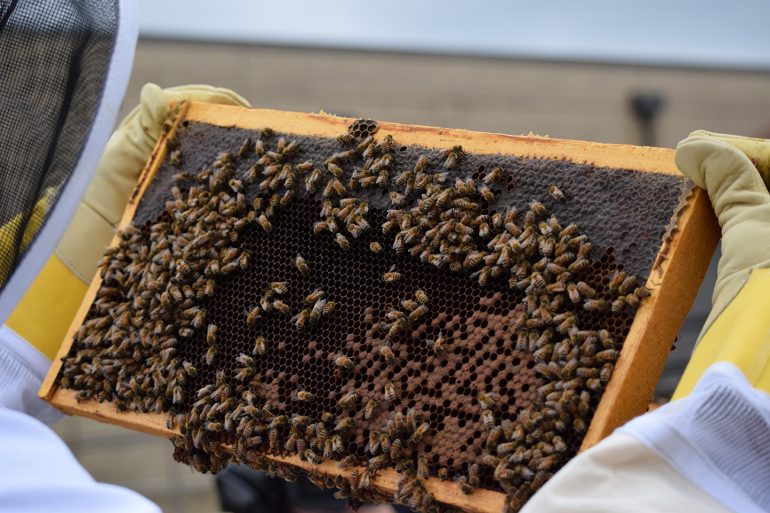By Dennis Ting and Beena Raghavendran
Capital News Service
HAGERSTOWN – John Anderson and James Jones walked into their classroom at the Maryland Correctional Training Center in Hagerstown on a recent morning wearing their jumpsuits to start another day of work.

But the inmates’ jumpsuits were thick, protective body suits with a mesh head cover, and their classroom was actually a yard — filled with thousands of buzzing bees.
Two correctional officers, Cpl. Chuck Neikirk and Lt. Jeff Golden, who are known around the prison as “master beekeepers,” are leading the new beekeeping program at the correctional facility. Neikirk said that the warden approached them about starting up a class after finding out that the two kept bees in their spare time.
The program started in August 2013 with a gift of about 100,000 bees from a bee apiary in Germantown. The correctional officers teach the inmates how to become beekeepers, about the environmental impact of the bees and how to process honey.
The program harvested its first batch of honey – almost five gallons of it – in August 2014. According to Neikirk, some of the honey went to the prison’s kitchen while some of it went to food banks in Maryland.

It’s a precarious situation for bees across the country. The bee population has declined from about 6 million colonies in 1947 to about 2.5 million today, the U.S. Department of Agriculture reported in 2012.
Experts point to a population loss called Colony Collapse Disorder, in which the queen bee survives, but the other adult bees that support her vanish. The USDA said farmers began reporting significant colony losses in 2006. Causes could include pesticides, parasites or global warming.
Dennis vanEngelsdorp, an assistant professor in the University of Maryland’s entomology department, said he hasn’t seen Colony Collapse Disorder in colonies he’s looked at recently. But nationwide, the loss rate for colonies has been about 30 percent.
And the loss is steeper in Maryland than in other parts of the country, vanEngelsdorp said.
It’s harder for bees to find in food in Maryland than in areas where farms are plentiful, such as the Midwest. And many beekeepers in Maryland do not take steps to prevent mites that harm the bees, vanEngelsdorp said.
“It’s important to realize that bees are essential to our food supply,” vanEngelsdorp said.
Without bees, the world is in trouble. Each year, more than $15 billion in U.S. crops and vegetables are pollinated by bees, including apples, berries and cucumbers, the National Resources Defense Council reported in 2011. And the global economic cost of the bee decline has been estimated as high as $5.7 billion per year, the NRDC said.
The threats to bees nationwide are further motivating the prison’s program. Prisons in states including Oregon, Texas and Washington have implemented similar beekeeping programs.
“The bees are such an integral part of the environment,” Neikirk said. “It’s essential for pollination. And without pollination, things just die.”

The pollinators have had an impact on the inmates at the prison, who check on the bees once weekly.
“I was ignorant about the bees,” Anderson said. “I was scared of them. They’re like spiders. They’re scary, but what most people don’t know is how important they are to the environment and the ecosystem.”
But aside from teaching the inmates about maintaining the bee population, the correctional facility hopes the program helps inmates prepare for life after prison.
“I’m very encouraged by what I’ve seen,” said Gerard Shields, the spokesman for the Maryland Dept. of Public Safety and Correctional Services. “I remember one of the guards telling me that the inmates, he said, ‘The thing I’ve learned is that bees work in a society. They work together and they know their jobs. And we as a society should be doing the same things.”
Anderson said he is looking forward to using his new skills to get back on track once he’s released from the prison.
“I wouldn’t mind having a hive in my backyard, teaching my son how to maintain them and to make honey,” Anderson said. “You can make some money with honey.”
Jones agrees, and said he knows his lessons learned in prison will push him forward.
“I know I wasn’t on a good path in my past life,” Jones said. “Me learning so much in Hagerstown is actually going to help me stay away from the streets and give me a new attitude on things.”


You must be logged in to post a comment.